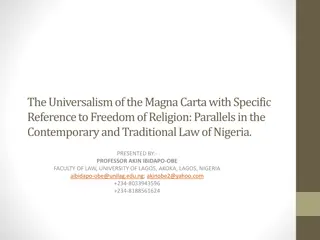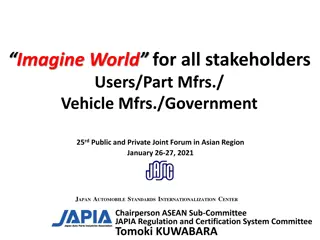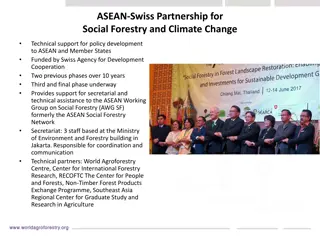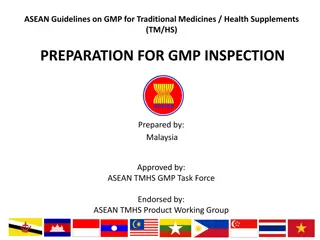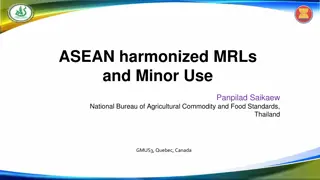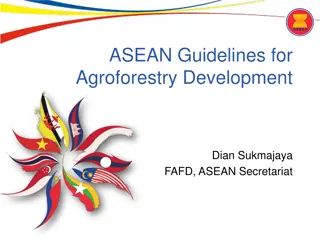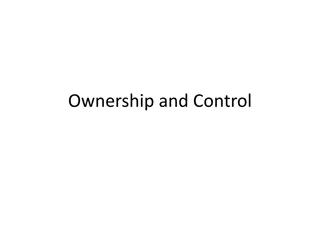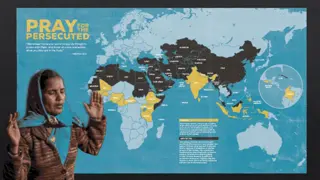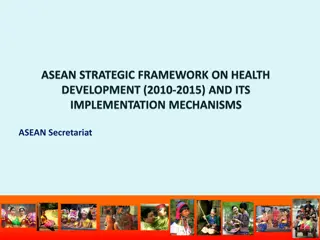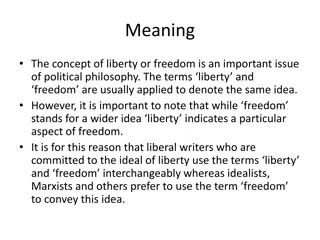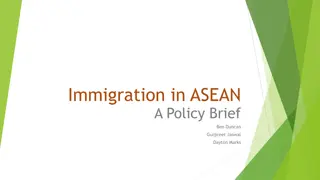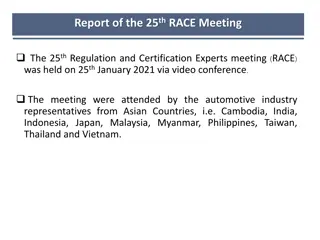Regulations on Religious Freedom in ASEAN Countries
Religious freedom in ASEAN countries is explored, covering religious diversity, domestic laws, and regional/international obligations. The main religions in ASEAN are Islam, Buddhism, and Christianity. Various countries ensure the freedom to practice religions, with provisions to protect public safety and national security.
Download Presentation

Please find below an Image/Link to download the presentation.
The content on the website is provided AS IS for your information and personal use only. It may not be sold, licensed, or shared on other websites without obtaining consent from the author. Download presentation by click this link. If you encounter any issues during the download, it is possible that the publisher has removed the file from their server.
E N D
Presentation Transcript
REGULATIONS ON RELIGIOUS FREEDOM IN ASEAN COUNTRIES Nguyen Thuy Duong (Duong Nguyen) PhD Student School of Law Vietnam National University (VNU)
Religious Diversity in ASEAN countries Religious freedom in Dosmetic Laws Regional and international obligations regarding to religious freedom
Religious Diversity in ASEAN countries ASEAN (Association of Southeast Asian Nations) was established on 8 August 1967 in Bangkok, Thailand) and now has 10 state members.
- Main Religions in ASEAN: Islam; Buddhism and Chinese traditional religion/belief (Confucianism, Taoism ) ; Christianity. - Islam: 42% (official religion of Brunei, Indonesia, Malaysia); Buddhism: 18 %; Christianity: 17% Source:http://en.reingex.com/ASEAN-Religion.shtml
Religious freedom in Dosmetic Laws RELIGIOUS FREEDOM Fundamental right Everyone has freedom to believe in religion or not No one should be discriminated or prosecuted based on his or her religion Freedom of Religion, Thought and Conscience should be limited in only oder to protect public safe, public health and national security.
religions may be practiced in peace and harmony by the persons professing them. Art 3(1) Cambodia: Buddhism shall be the state religion. Art 43; Freedom of religious belief and worship shall be guaranteed by the State on the condition that such freedom does not affect other religious beliefs or violate public order and security. Art 43; Every Khmer citizen shall be equal before the law, enjoying the same rights, freedoms and fulfilling the same obligations regardless of religious belief Art 31 Indonesia: The state guarantees all persons the freedom of worship, each according to his/her own religion or belief. - Art 29(2); Every person shall be free to worship and to practice the religion of his/her choice Art 28E; The rights to freedom of thought and conscience, freedom of religion are all human rights that cannot be limited under any circumstances. Art 28I(1) ; Every person shall have the right to be free from discriminative treatment based upon any grounds whatsoever. Art 28I(2) Lao PDR: Lao citizens have the right and freedom to believe or not to believe in religions. Art 43; The State protects the freedom and democratic rights of the people which cannot be violated by anyone. - Art 6; The State respects and protects all lawful activities of Buddhists and of followers of other religions, [and] mobilizes and encourages Buddhist monks and novices as well as the priests of other religions to participate in activities that are beneficial to the country and people. Art 9 Brunei: The official religion of Brunei Darussalam shall be the Islamic religion.... all other
Islam is the religion of the Federation, but other religions may be practiced in peace and harmony in any part of the Federation. - Art 3(1) Every person has the right to profess and practice his religion, and to propagate it. - Art 11(1) Every religious group has the right (a) to manage its own religious affairs; (b) to establish and maintain institutions for religious or charitable purposes; and (c) to acquire and own property Art 11(3) there shall be no discrimination against citizens on the ground only of religion - Art 8(2) Myanmar Every citizen is equally entitled to freedom of conscience and the right to freely profess and practise religion subject to public order, morality or health and to the other provisions of this Constitution. - Section 34 The Union also recognizes Christianity, Islam, Hinduism and Animism as the religions existing in the Union. - Section 362 Philippines The separation of Church and State shall be inviolable. - Article II, Section 6 No law shall be made respecting an establishment of religion, or prohibiting the free exercise thereof. The free exercise and enjoyment of religious profession and worship, without discrimination or preference, shall forever be allowed. No religious test shall be required for the exercise of civil or political rights. - Article III, Section 5 Malaysia
Every person has the right to profess and practice his religion and to propagate it. Art 15(1) Every religious group has the right (a) to manage its own religious affairs; (b) to establish and maintain institutions for religious or charitable purposes; and (c) to and acquire and own property and hold and administer it in accordance with the law. - Art15(3) there shall be no discrimination against citizens of Singapore on the ground only of religion - Art 12(2) Thailand A person shall enjoy full liberty to profess religion, religious sect and creed, and observe religious precept or exercise a form of worship in accordance with his or her belief; provided that it is not contrary to his or her civic duties, public order or good morals. - Section 37 Unjust discrimination against a person on grounds of religious belief shall not be permitted. - Section 30 Vietnam (1) Everyone has the right to freedom of belief and of religion, and has the right to follow any religion or follow no religion. All religions are equal before the law. (2) The State shall respect and protect the freedom of belief and religion. (3) No one may violate the freedom of belief and religion, nor may anyone take advantage of a belief or religion in order to violate the law. - Art 24 Singapore:
Regional and international obligations regarding to religious freedom International human rights instruments including binding commitments to the protection of the right to freedom of thought, conscience, and religion that have been ratified by ASEAN Member States: International Covenant for Civil and Political Rights (ICCPR); International Covenant on Economic, Social and Cultural Rights (ICESCR); International Convention on the Elimination of All Forms of Racial Discrimination (ICERD); Convention on the Rights of the Child (CRC); Convention on the Elimination of All Forms of Discrimination against Women (CEDAW); Convention against Torture and Other Cruel, Inhuman or Degrading Treatment or Punishment (CAT); International Convention on the Protection of the Rights of All Migrant Workers and Members of Their Families (ICMW); Convention on the Prevention and Punishment of the Crime of Genocide, and the Convention relating to the Status of Refugees.
ICCPR State members that have ratified the covenant: Cambodia, Indonesia, Lao PDR, the Philippines, Thailand, and Vietnam Article 18: [t]his right shall include freedom to have or to adopt a religion or belief of his choice, and freedom, either individually or in community with others and in public or private, to manifest his religion or belief in worship, observance,practice and teaching.
Convention on the Rights of the Child (CRC) Article 14: (1) States Parties shall respect the right of the child to freedom of thought, conscience and religion. (3) Freedom to manifest one's religion or beliefs may be subject only to such limitations as are prescribed by law and are necessary to protect public safety, order, health or morals, or the fundamental rights and freedoms of others . Brunei, Malaysia : reservation on articles14



